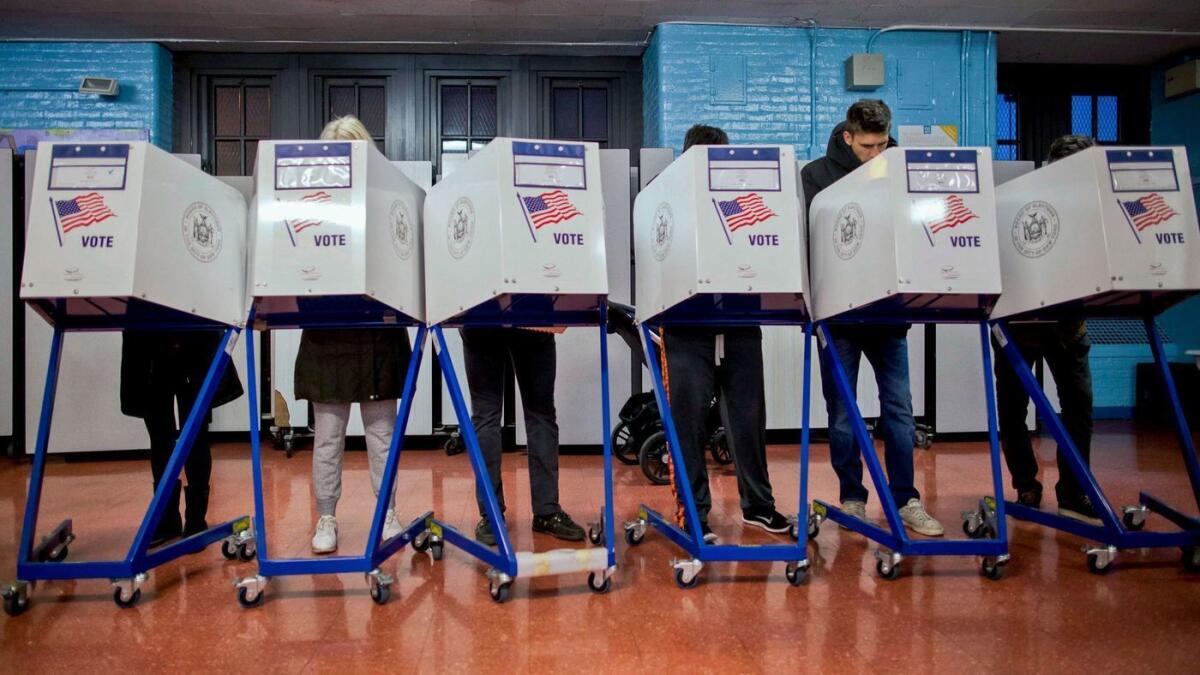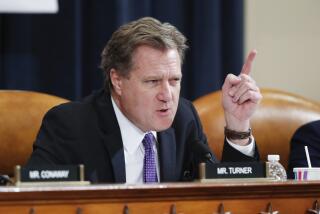U.S. election systems need stronger defenses against cyberattacks, senators warn

A bipartisan group of senators Tuesday said the nation’s election systems, targeted by Russian intelligence operatives in 2016, are badly in need of federal funds and expertise to prevent cyberattacks that could impede or distort future elections.
The Senate Intelligence Committee, as part of its investigation into Russian efforts to influence the 2016 presidential campaign, faulted the government’s lackluster response to the Russian hacking at the time, and said states need help in replacing vulnerable voting systems.
“Let me say this with a great deal of confidence — it is clear the Russian government was looking for vulnerabilities in our election system and highlighted some of the key gaps,” said Sen. Richard M. Burr of North Carolina, the committee’s Republican chairman, outlining some of his panel’s findings before a hearing Wednesday.
As part of Moscow’s scheme to disrupt the 2016 campaign and help elect President Trump, Russian hackers attempted to penetrate computerized voting systems in at least 21 states, and succeeded in penetrating the Illinois voter registration database, officials said.
There’s no evidence that any ballots were sabotaged or changed, and U.S. intelligence officials quickly detected the activity by foreign hackers. But they didn’t provide real-time warnings to election officials in the states and counties under digital attack, senators said.
Sen. Mark R. Warner of Virginia, the committee’s top Democrat, said it took Homeland Security officials nine months to notify the 21 states about the intrusions.
“We were all disappointed that states, the federal government and the Department of Homeland Security was not more on their game in advance of the 2016 election,” Warner said.
At the time, intelligence officials were reluctant to share classified information with county and state election officials who didn’t have security clearances.
Since then, many state election administrators have obtained or have applied for clearances — but some say they still don’t get the information they need. The committee urged the administration to expedite the process.
“When the federal government has access to intelligence information, it’s really important that they have a way of getting that information out in timely ways,” said David J. Becker, executive director for the nonprofit Center for Election Innovation and Research.
Becker said federal-state cooperation is “light-years ahead” of 2016 but the states remain badly in need of federal money to replace outdated election systems. Most states use voting machines and other equipment more than a decade old, with outdated software.
Five states use voting machines that don’t produce an auditable paper trail of ballots, which the committee said should be the minimum security standard. And the panel said all state election systems should have two-factor security authorization to operate, making it more difficult for hackers to access or sabotage the data.
With some 2018 primary races already underway, California Secretary of State Alex Padilla said “time is of the essence” to fix security gaps before the first ballots are cast.
“The urgency is there on our part,” he said. “I don’t see the urgency coming out of the Oval Office. I’m hoping Congress can overcome that.”
Burr said the Senate should provide more money to assist states, possibly in the next spending bill, but the report falls short of specific recommendations for funding.
The consensus on the Senate committee about the danger of the Russian intrusion, and the failure of the White House to respond to it, stands in sharp contrast to squabbling on the House Intelligence Committee.
The Republican majority in that committee recently ended its inquiry with a finding that Moscow had not sought to help Trump win the White House — a conclusion at direct odds with the U.S. intelligence agencies.
In two declassified reports, the intelligence community said sophisticated hackers backed by Russian intelligence had penetrated computers used by top Democrats and then leaked thousands of internal emails to undermine Hillary Clinton’s campaign.
Moscow also allegedly created a campaign to spread disinformation to U.S. voters on social media using stolen and fake IDs. The special counsel, Robert S. Mueller III, recently obtained criminal indictments against 13 Russians and three entities who were allegedly involved in that campaign.
Trump has repeatedly downplayed the gravity of the Russian operation by insisting that it didn’t change votes.
But the senators, echoing concerns from U.S. intelligence chiefs, warned that the nation is still at risk.
“It may not be the Russians next time,” said Sen. James Lankford (R-Okla.). “It could be the North Koreans. It could be the Iranians. It might be a domestic hacktivist group that uses that same playbook to try to seed chaos.”
Twitter: @jtanfani
More to Read
Get the L.A. Times Politics newsletter
Deeply reported insights into legislation, politics and policy from Sacramento, Washington and beyond. In your inbox three times per week.
You may occasionally receive promotional content from the Los Angeles Times.








